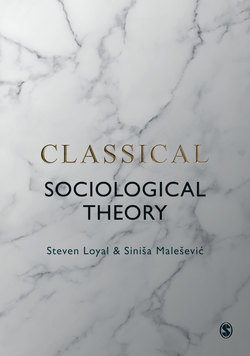Читать книгу Classical Sociological Theory - Sinisa Malesevic - Страница 43
На сайте Литреса книга снята с продажи.
Contemporary Relevance and Applications
ОглавлениеThere is no doubt that Confucius’s teachings had much more impact on the state policies and the social behaviour of millions of people, than those of Ibn Khaldun. For one thing Confucianism was an official state doctrine of China for more than 2,000 years. From the second century bce (during the Han dynasty) until 1948, Confucian teachings were institutionalised as the principal state narrative and as such were integral to the system of education that reproduced the civil service structure of Mandarin bureaucrat scholars who were crucial for the shape of the Chinese state for centuries.
For another thing, in much of East Asia, Confucianism gradually developed into something akin to a religious doctrine and as such it has deeply influenced the behaviour of ordinary individuals for many generations. Even though the Chinese communists were initially hostile to what they regarded as a profoundly conservative ideology, recent years have witnessed a major re-evaluation of Confucius in communist China. The consequence of this top-down revision within the Communist Party of China is much more space being given to Confucius’s teachings in the mass media, educational system, cultural diplomacy and even popular culture. The fact that Confucianism has a large and strong following throughout East Asia and continues to influence the behaviour of hundreds of millions of people would indicate that its contemporary relevance is enormous.
Sociology, Modernity and Eurocentrism
The critique of Eurocentrism reflects the need to go beyond established sociological perspectives in pursuit of a truly cosmopolitan sociology suited to contemporary globalised societies. That classical sociology was justified in assigning world historical significance to specific developments in European societies is not disputed. Instead, the critique of Eurocentrism problematises the generalisation of Western perspectives over other forms of knowing, with its implicit assumption of cultural superiority and exaggeration of difference. This is perhaps most pernicious in the postulates of modernisation theory, as it was developed in the 1950s. With the contemporary field of post-colonialism spearheading movements to ‘decolonise’ the literature and enable the voice of the subaltern to be heard, sociology may yet embrace non-European forebears.
However, while Confucian teachings have a substantial impact, as a form of state policy and society-wide cultural practice, these ideas had less impact on the development of social science in general and sociological analysis in particular. Although scholars have utilised Confucian concepts and principles to articulate a neo-Confucian sociological tradition (Seok-Choon et al., 2011; Cho, 1996); the deeply normative character of Confucius’s writings has prevented development of an original and vibrant sociological school of thought.
In contrast, Ibn Khaldun’s contributions have inspired generations of scholars to use and refine his original proto-sociological models and apply them to a variety of social contexts in the contemporary world. Hence scholars have made use of his theories of state formation to analyse the rise and fall of civilisations in Africa, Asia, the Middle East and further afield (Alatas, 1993, 2007, 2014; Arnason and Stauth, 2004; Ortega y Gasset, 2000 [1976]; Gellner, 1981). Furthermore, Ibn Khaldun’s concept of asabiya has retained much of its sociological relevance throughout the centuries and as such has been deployed to explain the dynamics of social cohesion in North Africa, the Ottoman Empire, Safavid Iran, Syria and Saudi Arabia among others (Abir, 1987; Alatas, 1990, 2014; Gellner, 1969, 1981) as well as to analyse the transformation of micro-level solidarities through time (Al-Azmeh, 1997; Lacoste, 1984; Malešević, 2015). More recently scholars have applied Khaldunian arguments to specific contemporary contexts ranging from issues such as the political legitimacy in Morocco (Cory, 2008), the contrasting state development trajectories in Algeria and South Africa (Wylie, 2008) and the social sources of the political disintegration in post-Gaddafi Libya (Elkeddi, 2015). The recent political fragmentation of Libya is particularly instructive in the sense that a Khaldunian-type analysis can help us explain the speed and direction of this unprecedented state collapse. The regional experts have emphasised how Gaddafi-era Jamahiriya was a rentier state that fostered re-tribalisation as a mechanism to maintain a hold on power. Thus instead of establishing organisational channels for the political participation of Libyan citizens, Gaddafi replaced the existing organisational structures with direct ties to the tribal leaders (Tabib, 2014). Hence, the Libyan polity had a very feeble organisational core while local power remained in the hands of the tribal chefs. Consequently, the collapse of the Gaddafi regime was paralleled by state fragmentation along tribal lines, with the paramilitary units representing different tribal groupings, just as Ibn Khaldun would predict. Ibn Khaldun’s work has also been used to explore the social dynamics of the frontier experience within and outside the Islamic cultural sphere (Newby, 1983).
